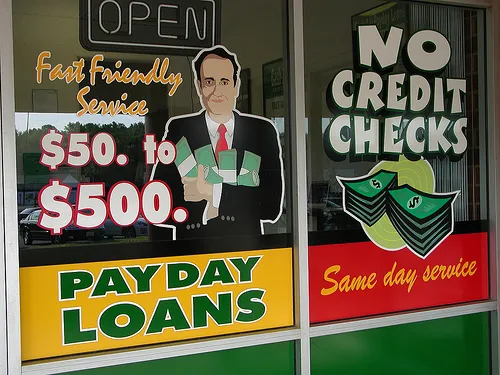For some, the idea of getting a loan for an unforeseen expense still brings up images of putting on a suit and meeting with a friendly local banker. For many others, the experience is somewhat less idyllic.
Payday loan businesses have been around for years. Even so, many Americans have no idea about these establishments. Depending on where you live, you may have never come into contact with one. However, a quick search reveals 152 such businesses in Louisville, with most concentrated along a few roads.
Are they a problem? Do they need fixing? Yes, and yes. Read on and you’ll see why.
What are Payday Loans?
Payday loans are short term loans, marketed as a way to help people with sudden, unforeseen expenses, such as a car repair or medical bill. A typical loan will charge a 15% interest rate over a two week period – an effective 391% APR. This rate becomes a bigger issue due to the fact that borrowers are often required to pay the entire principal at once. (Imagine having to pay the entire principal of your home or car in one lump sum.)
For those who take out these loans, it can be the beginning of more financial hardship.
- Only 15% of borrowers are able to repay on time without borrowing again.
- One in five default.
- Two thirds need to take out another loan.
- Sixty percent of the time, the fees are higher than the original loan amount (the median loan is $350 while the median fee is $458).
The median income of borrowers is $22,400, and for those who borrow, the median number of loans taken out over the course of a year is 10. Industry-wide, 75% of fees are generated by high frequency borrowers. These fees give lenders a strong incentive to make repayment difficult.
Beyond the issues of repayment, large concentrations of payday lenders in a neighborhood may be associated with higher violent crime rates, an issue for all residents, regardless of whether they participate in the process. Loans also make it more difficult to pay mortgages, rent, and utilities, and may cause the delay of needed medical care.
Are These People Just Bad With Money?
Many argue that those who rely on these loans are simply poor money managers. However, Americans as a whole are dramatically unprepared for sudden expenses. Just 38% of Americans have enough cash on hand or in savings to cover an emergency such as a $500 car repair, and 29% have no savings whatsoever. This leaves a large number of citizens at risk for taking out such a loan. In 2013, 210,000 Kentucky residents took out payday loans, paying around $115 million in fees and interest.
While credit cards may fill this need for those who qualify, those whose credit score precludes them face a dilemma. In areas with large concentrations of payday lenders, chances are there aren’t many banks nearby. In emergency situations, payday lenders become very attractive. They are faster than traditional banks, there is little to no waiting period, and they are open much later than banks. These “underbanked” people form one of the key constituencies of payday lenders. If you have a job, an income, and little financial security, you become very attractive.
Because of these issues, payday lenders typically face criticism for unfair business practices, financial exploitation, and extortion. Seen as an easy solution, the fees and interest often leave people in worse financial shape than before they took out the loan. Criticism continues to pile up due to the appearance that lenders target certain groups or neighborhoods. Faced with these criticisms, the PDL industry has responded by blaming borrowers for misusing their services. For them, it’s a personal responsibility issue.
Dealing with this industry is complicated. The PDL industry argues that they are a vital source of financial services for those who have no other credit option. To an extent, this is true. For this reason, they are hard to ban outright. People do need a way to cash checks. People do need a way to get a loan. The underbanked need these services.
What Can Be Done?
There are, however, those who are trying to alleviate the negative effects of high interest lenders.
- Verify repayment ability – The Consumer Financial Protection Bureau has released a proposal to make lenders verify a borrower’s ability to repay and limit the number of loans that could be taken out consecutively.
- Change the top APR allowed – Under current Kentucky law, interest on short-term loans is limited to $15 per $100 borrowed, with no more than two loans to be taken out at a time, with a cumulative $500 cap. This past winter, the State Senate considered SB 32, which would have replaced current regulations with one that limited loans to an APR of 36% (the limit currently set for members of military). I went to Frankfort to help lobby for this bill, and although it ultimately did not pass, it was encouraging to see members of the legislature taking active steps to protect citizens. It was also encouraging to see so many groups of citizens coming to Frankfort to make their voices heard.
There is also work that can be done in Louisville.
- Allow for payment on the principal over time, instead of demanding complete repayment at once.
- Enact zoning laws limiting where such businesses can go or how many payday lending stores can be in one area.
Other cities across the country have taken action, most notably in Texas. Ordinances in Dallas, Austin, El Paso, and over a dozen other cities have all worked to limit the effect of the industry on their citizens. The El Paso ordinance has lowered the number of loans by 39%, lowered fees paid by 32%, and lowered the volume of refinances by 49%. Laws like these could go a long way to help those in Louisville struggling with debt.
A 36% cap on interest is a great start, allowing people access to emergency funds with less risk of getting caught in a cycle of debt. But more can be done. The reason these businesses exist is that people often have no other option. Cities and states should work to help provide alternatives.
- Louisville should continue and expand its Bank on Louisville program, which works with banks and credit unions to begin serving underbanked parts of the city.
- Increasing wages would help people save money for when an emergency arises.
- Expanding public transit options in the city would make car repairs less urgent.
- Expanding health care access would make hospital visits easier to deal with.
In the end, going after the reasons people take out such loans, treating the underlying issues, may do more to solve the problem than going after the loans themselves.
– PL –
If you are considering a payday loan, please first check out alternatives provided by the FTC. If you have taken out a loan and feel the experience has been less than ethical, you can file a complaint with Kentucky’s Public Protection Cabinet.
Photo by taberandrew 
Comments








